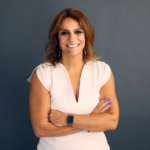Insights
Clyde Deskside: A Conversation with Lisa Josephy, Managing Director of Clyde Group’s Health Care Practice.

“Our motivation should be creating a sense of societal empowerment. In this way, I see our role as not just communicators, but as agents of social change.”
This is our second in a series of Clyde Deskside conversations with the people who lead Clyde Group today, talking with them about their professional life and personal journey. Our hope is that these conversations can shed some light on how Clyde Group operates as the best agency to work for and the best agency to work with, as well as where the future of the industry is headed.

Managing Director, Health Care Practice Lead
Clyde Group
Lisa Josephy is a managing director and the head of our healthcare practice at Clyde Group. With over 20 years of healthcare communications and agency experience, Lisa was brought on in 2021 to provide strategic oversight to existing healthcare clients and help further expand practice offerings and expertise. During her career, Lisa has led change-oriented, award-winning integrated communications and advocacy campaigns on behalf of a wide variety of pharmaceutical and biotech brands, including prescription medications, OTC treatments, and medical devices. She has led national and global campaigns for some of the world’s leading companies including Pfizer, Johnson & Johnson, and Amgen. Lisa’s expertise spans product launches, large-scale patient education initiatives, health equity, advocacy relations, influencer campaigns, and more.
Tell us about your career journey and how you got to your current role?
Reflecting on my career path, I think it's interesting to consider where I started and where I am now. I actually did not start off in public relations. I went to graduate school at Georgetown to get my masters in public policy, with the intention of doing something really meaningful in the public health arena. My first “real” job was at a consulting firm working on healthcare-related government projects and, even though I liked the substance of it, I yearned to do something a little more team-oriented, fast-paced, and creative. After I relocated to New York to be closer to family, I found myself at a public relations agency doing work that was much more aligned with product marketing than public policy, and that’s been my focus for the bulk of my career. Twenty years later, I’m working at Clyde Group, a DC firm that specializes in very purpose-driven work, and I’m very excited by the opportunity to get back to my roots and marry these two worlds.
What did this unusual route to where you are today teach you?
It taught me to expect the unexpected and to be more comfortable with the unknown. And to realize that while your path may be unclear and winding ultimately you'll find your way, no matter what.
What would you tell your younger self about that career path given what you know now?
I would warn that the journey is not going to be as clear as you think it might be when you’re first starting out. I never thought I would end up in public relations, but I landed here and this is where I've been for over 20 years. So I think it’s about being flexible and going with the flow. As a young person, you’re expecting everything to be linear: you go to college, have a major, maybe go to grad school, and you’re very focused on a particular career. But life and your career path can pivot for a variety of reasons. So I would tell a younger person that while it’s absolutely great to have a plan, it’s OK when you don’t always know what your next step will be.
What is your favorite part of working at a PR agency?
I’d say it has to be the diversity of work. It gives me the opportunity to learn completely new things year-over-year, even after more than two decades in the field. I'm always gaining new knowledge, new expertise, and new skills. That keeps things fresh and helps satisfy my intellectual curiosity.
What is your favorite type of PR/comms?
I really love it all — everything from narrative building to thought leadership to advocacy. That's why I’ve chosen to work at agencies my entire career, so that I don't have to be limited. But if I had to choose only one type of PR it would be brand communications. I love storytelling and the storytellers that build the critical connections between a brand and its target audiences. As a healthcare communicator, I really nerd out when a new product comes to market that fills an unmet medical need. Not only do we get to help build awareness for the product, but we can also help patients live better by fostering better understanding of a disease, raising awareness of new treatment strategies, and improving access through advocacy.
What aspect of the PR/comms industry has changed the most drastically over your career?
I’d say how and where we’re engaging with key audiences. Today, that’s happening mainly online and virtually. In the past, we were very focused on securing earned media coverage to reach audiences or find them at events or through other offline engagement activities. And while I think there’s still real value in those things, I believe that digital has to be at the core of any communications initiative. This was true even before the pandemic, but I think it's more pronounced now.
How do you see the communications industry changing over the next five years?
Over the last few years, the lines between different marketing disciplines have become more blurry and I see that continuing in the coming years. Agencies, whether they be PR, advertising, or digital, have broadened their expertise beyond their original purviews. That’s why I think it’s so important for an agency to find other ways to differentiate itself to remain competitive and relevant. Here at Clyde Group, that means constantly striving to make ourselves the best agency to work with and the best agency to work for. If you want to survive over time, you need to find other ways to innovate and show value.
What trends in the healthcare industry have you seen recently that are most interesting to you?
Health equity is huge. While health disparities have been a long-standing issue in the US, the pandemic really brought to light how pervasive they are and how deep they run. Today, health equity has become a top concern for healthcare executives and organizations across the healthcare system, and prioritizing the development and execution of a health equity strategy is fundamental to an organization’s success. Another significant trend is increased interest in healthcare topics among the public. Here too, the pandemic was a big part of putting healthcare on the national stage. Not only did we have to pay attention to a major public health threat, public safety measures, and vaccine and therapeutic development, but it also brought issues of mental health and health disparities to the forefront. Other issues like reproductive rights and the costs of medicine have kept healthcare very much in the conversation, and I don’t see a shift in this trend anytime in the near future.
What’s your proudest career moment or accomplishment thus far?
It’s less about one particular accomplishment and more about receiving positive feedback about a PR initiative from people in the healthcare community, whether it be patients, advocates, or healthcare professionals. I’m really proud when I hear that our efforts have made a difference in some way. Whether a program has improved someone’s well-being or how they approach managing their health or maybe caring for a loved one, it shows the real impact of the work we do. It’s not measured by media impressions or engagements with social media posts, but more by change of behavior, belief, or, most importantly, health outcomes.
What do you think is the most overused jargon in PR these days?
I think there's so much jargon in PR and marketing. But if I had to choose one phrase, it would be taking a conversation “offline” or “parking lot” a discussion. I don't understand why we can’t just say let’s just chat about it one-on-one.
And finally, what has been the funniest moment in your career?
Several years ago, my team was at a celebrity’s house filming a video as part of a campaign. She had a lot of pets that were very noisy and kept getting in the way. So while I was originally there to provide senior oversight for the shoot, I ended up having to watch the dog, the cat, and a very large and unfriendly parrot in the spokesperson’s bathroom for hours while the rest of the crew captured footage. As a PR person, you have to be ready to do things you never anticipated you’d be doing — and get a good laugh while you’re doing them!